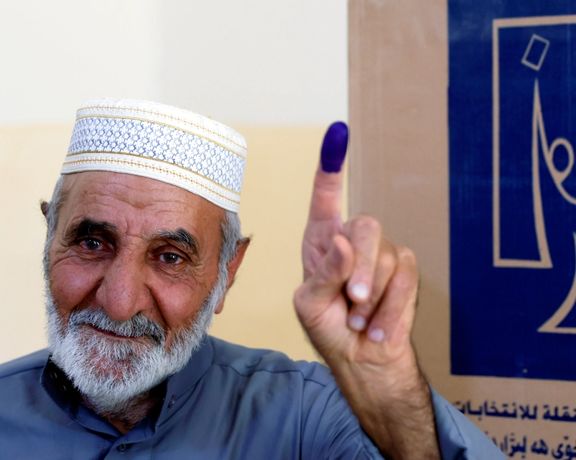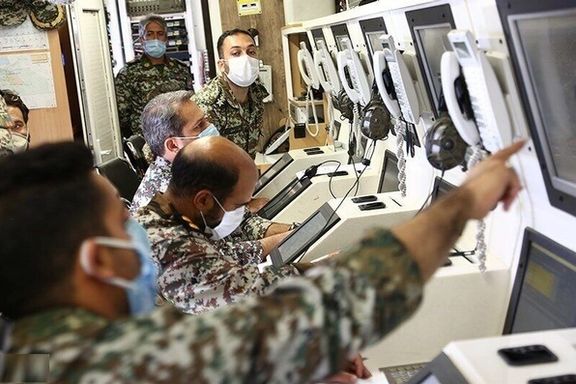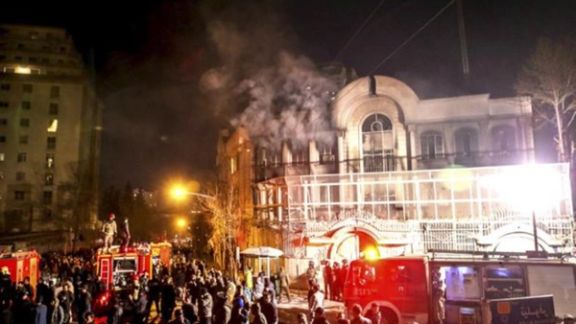Iraqi Pro-Iranian politician Rejects Election Results As Fabricated - TV

One of the most powerful pro-Iranian figures in Iraq has rejected the results of Sunday's elections as "fabricated", according to a pro-Iranian TV channel.

One of the most powerful pro-Iranian figures in Iraq has rejected the results of Sunday's elections as "fabricated", according to a pro-Iranian TV channel.
"We will not accept these fabricated results, whatever the cost," the channel Al-Aahd cited Hadi al-Amiri as saying on Tuesday on its Telegram messaging account, after a top Iranian military officials reportedly visited Baghdad on Monday.
Iran-backed parties with links to militia groups accused of killing some of the nearly 600 people who died in mass protests in 2019 took a blow in the election, winning less seats than in the previous vote, in 2018.
Shi'ite Muslim cleric Moqtada al-Sadr's party was the biggest winner in the election held on Sunday, according to initial results.
Initial results showed Shia cleric Moqtada Sadr had won more seats than expected in Iraq’s election Sunday taking 73 seats, a spokesman of the movement said.
In a reflection of Iran’s influence in its neighbor, Iraq’s Shafaq daily Monday quoted a government source that General Esmail Ghaani, commander of the Revolutionary Guards (IRGC) extra-territorial al-Quds group, had met officials and leaders in Baghdad within 24 hours of polls closing to discuss next steps.
With reporting by Reuters

The brother of Iranian activist-cum-citizens’ journalist Sepideh Gholian reported Monday that his sister, on prison furlough, had been arrested at her home.
"A few minutes ago over thirty female and male agents attacked Sepideh Gholian's house, abducted her and took her to an unknown place, ”Mehdi Gholian wrote on Insatgram. “They also confiscated the mobile phones of all other family members."
An hour later Mehdi Gholian wrote in another social-media post that the Prisons Organization was responsible for the arrest.
In a series of tweets in September, Sepideh Gholian (Qolian), who was on parole from Bushehr prison, southern Iran, alleged abuse of female prisoners in the prison. She wrote that she had reported 20 cases to the authorities, including five described in her tweets, but had received no response.
"I knew I would face a godforsaken hell when I was banished to this prison last year," wrote Gholian, who had been sent to Bushehr prison in early March from Evin prison, Tehran. "But I couldn't even imagine the brutality reigning in this prison."
In March 2021, Gholian was taken "in handcuffs and chains," according to labor activist Esmail Bakhshi, from Evin to Bushehr, 1000km from Tehran. Bakhshi said Gholian had been told she was being taken to Ahvaz prison in her native Khuzestan province and only later realized she was in Bushehr, 430km from Ahvaz.
Gholian was sentenced to five years’ jail for 'disrupting public order' and‘assembly and collusion against national security' after arrest in 2018 following her role in publicizing labor protests in Khuzestan. Gholian’s memoir from time in Sepidar prison, Khuzestan, was published by Iran Wirein June 2020. She has gone on hunger strike several times.
Gholian made a confession that was aired by state television (IRIB) in January 2019. In the program she was described as an agent provocateur with ties to Marxist groups abroad who had encouraged a strike at the Haft Tappeh Agro-Industrial Complex in Khuzestan.
Gholian later alleged that Ameneh-Sadat Zabihpour, an IRIB journalist involved in filming the confession, had been involved as an interrogator and had tortured her to her to confess before the camera. Confessions, often full of claims of links to foreign conspiracies, have long played a significant role in Iranian political trials.

Iran’s air defenses conducted drills on Tuesday on countering electronic and cyber warfare, the Revolutionary Guard air defense headquarters announced.
Brigadier General Ghader Rahimzadeh, commander of the joint air defenses headquarters said that on the first day of drills dubbed Sky Defenders, units from Iran’s traditional army air defenses, IRGC Aerospace Force and the Air Force experimented with various tactics of countering electronic and cyber warfare.
Rahimzadeh said the drills aimed to evaluate the impact of possible electronic warfare of an adversary on Iran’s air defense radars. He added that the exercise was successful in identifying targets in an “environment of electronic warfare.” He added that locally manufactured electronic warfare equipment is being used in this exercise. In this stage jamming drones were used to test anti-aircraft interception systems and the stable operation of radars.
He added that “successful tests were conducted” on how to jam the adversary’s electronic warfare drones.
Iran’s radar systems, some based on domestic technology are not as advanced as need be in case of engagement with a technologically superior adversary.
Iran conducted major ground exercises last week on its northwestern borders near the Republic of Azerbaijan, after tensions flared up between the two counties.

Iran and Saudi Arabia are near agreement to restore diplomatic relations by reopening consulates, a diplomatic source has told AFP news agency on Monday.
The foreign diplomat who resides in Saudi Arabia said an agreement to ease tensions is imminent.
"They, in principle, have reached an agreement to reopen consulates... and I think an announcement of normalization of ties may come in the next few weeks," the diplomat told AFP on condition of anonymity.
The two Middle Eastern arch-rivals began talks in April with Iraqi mediation in Baghdad and have continued discussions since then. Iran has made optimistic statement in recent days, saying the talks “are on the right path”.
Iran’s foreign ministry said on Monday that Yemen, a major contentious issue between the two countries, is part of the talks.
The new government in Tehran headed by hardliner president Ebrahim Raisi has emphasized that Iran’s priority is improving relations with its neighbors. This could be related to Western pressure on Iran to change its regional policies and stop creating tension with meddling in Arab countries.
Saudi Arabia, which supported former US president Donald Trump’s decision to pull out of the 2015 nuclear agreement and impose ‘maximum pressure’ sanctions against Iran, wants Iran to stop supporting armed proxies in the region, including the Houthis in Yemen.

Microsoft announced Monday that it has been tracking hacking activities by an Iran-linked group that targeted US and Israeli defense and other key companies.
The hackers were trying to guess passwords of users and accounts to penetrate defense technology companies and Persian Gulf ports of entry, as well as global maritime transportation companies with ties to the Middle East.
The group known as DEV-0343 was able to compromise just 20 passwords among hundreds it tried to penetrate, Microsoft said, adding, “DEV-0343 continues to evolve their techniques to refine its attacks. MSTIC noted that Office 365 accounts with multifactor authentication (MFA) enabled are resilient against password sprays.”
Iranian hackers have been highly active in the past decade and are believed to be as dangerous as Chinese and Russian groups that operate either within their respective intelligence services or are closely associated with them.
“Microsoft has directly notified customers that have been targeted or compromised, providing them with the information they need to secure their accounts,” the company said in a statement.
The focus of the hackers was defense technology companies working on military-grade radar development, drone technology, satellite systems and emergency response communication systems. “Further activity has targeted customers in geographic information systems (GIS), spatial analytics, regional ports of entry in the Persian Gulf, and several maritime and cargo transportation companies with a business focus in the Middle East,” Microsoft said.
As in the past cases of Iranian hacking aimed at military and sensitive economic targets this operation “likely supports the national interest of the Islamic Republic of Iran,” Microsoft said, and added, that its assessment shows “this targeting supports Iranian government tracking of adversary security services and maritime shipping in the Middle East to enhance their contingency plans.”
Microsoft did not attribute the hacking to any particular Iranian government entity, but the Islamic Revolution Guard Corps (IRGC) is known for its large ‘cyber army’ that engages in both suppression of internet access and cyber surveillance within Iran and disinformation activities abroad, as well as sophisticated hacking of Western and other targets.
Facebook also announced on Monday it has dismantled dozens of accounts engaged in dissemination of fake news within Iran. "We removed 93 Facebook accounts, 14 Pages, 15 Groups and 194 Instagram accounts in Iran that targeted primarily domestic audiences in that country, particularly in the Lorestan province," The social media company said.
CNN quoted Microsoft’s John Lambert as saying that his corporation discovered the hacking activity when responding to a breach of a US financial services company this summer. He added that Microsoft decided to release the information now to help organizations prepare for follow-on hacking attempts.

Lebanon's Hezbollah chief Hassan Nasrallah repeated calls Monday for the cabinet to seek a US sanctions waiver to import Iranian fuel amid crippling shortages.
Nasrallah said the total blackout that occurred on Saturday when Lebanon's two largest power plants ground to a halt was like a "clinical death" for the country.
The Iran-backed Lebanese Shi'ite Hezbollah group has been coordinating Iranian shipments of fuel oil and gasoline for Lebanon since August as shortages spread amid an economic meltdown, despite U.S. sanctions on Iranian oil sales.
However, so far it is not clear if Hezbollah delivered any fuel to the country’s power stations or how the fuel was used.
Lebanese Prime Minister Najib Mikati has said the Iranian shipments constitute a breach of his country's sovereignty.
Iran sends the fuel oil shipments organized by Hezbollah to the port of Baniyas in Syria and from there they are transported by truck to Lebanon.
Iran's Foreign Minister Hossein Amir-Abdollahian, on a visit to Beirut last week, said his country was ready to build two power plants in Lebanon, one in Beirut and the other in the south of the country, in a period of 18 months. The offer is more of a publicity stunt as Iran itself is gripped by power shortages unable to meet demand.
On Monday Nasrallah urged the cabinet to respond to his offer.